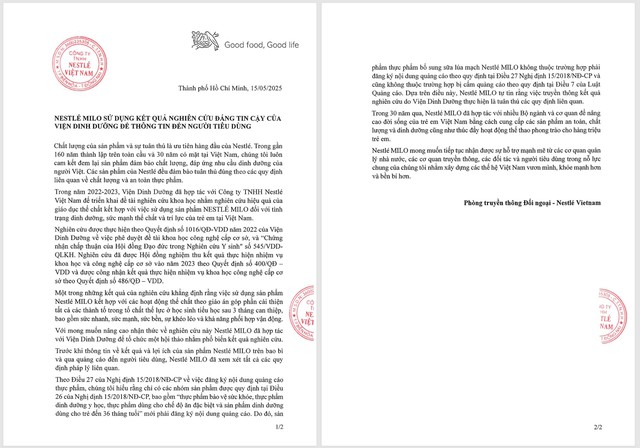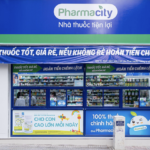Nestlé Vietnam Ltd. has issued a statement regarding its use of research findings from the Institute of Nutrition in its Nestlé MILO product communications.
Nestlé Vietnam asserts that all its products adhere to relevant regulations concerning quality and food safety.
According to Nestlé Vietnam, in 2022-2023, the Institute of Nutrition collaborated with Nestlé Vietnam Ltd. to conduct a scientific research project aimed at studying the effectiveness of physical education combined with the use of Nestlé MILO on the nutritional status, physical strength, and cognitive abilities of children in Vietnam.
The research was carried out in accordance with Decision No. 1016/QD-VDD of 2022 by the Institute of Nutrition, approving the base-level scientific and technological research topic, and the “Certification of Approval by the Bioethics Council” No. 545/VDD-QLKH. The research was evaluated by the Council for Scientific Research Results Assessment for base-level scientific and technological tasks in 2023, as per Decision No. 400/QD-VDD signed by the Institute Director, following the completion of the base-level scientific and technological task under Decision No. 486/QD-VDD.
One of the main objectives of the research was to assess the impact of using Nestlé MILO in combination with a physical education program based on a curriculum to improve the nutritional status, physical strength, and cognitive abilities of children after three months of participation, especially those at risk of facing challenges in their motor development.
“The research results of Nestlé MILO and the Institute of Nutrition are scientific data that have undergone rigorous and objective scrutiny, adhering to the requirements of scientific research.”
“With the desire to provide accurate and objective information to consumers, Nestlé MILO has considered these research results in its communications to the public.” stated Nestlé Vietnam in its document.
Nestlé maintains that communicating the research results conducted by the Institute of Nutrition complies with relevant regulations. The company cites that “according to Clause 2, Article 27 of Decree 15/2018/ND-CP, contents related to the benefits of Nestlé MILO, a supplementary food product, do not fall under the cases requiring advertising content registration. Additionally, according to Article 7 of the Law on Advertising, they do not fall under the cases of prohibited advertising.”

Earlier, on April 21, 2025, the Institute of Nutrition sent Official Letter No. 368 to Nestlé Vietnam regarding the “inspection of the use of scientific research results in communications,” clearly requesting that: “The Company inspect and review the content of communications and advertisements for food products. If there is any information related to the Institute of Nutrition that violates the above regulations, it is requested to immediately remove it to ensure strict compliance with the law in the activities of communication, advertising products, and disseminating knowledge about nutrition to the community.”
Following the Institute of Nutrition’s document, Nestlé Vietnam also issued Document No. 23 on April 24, 2025, in response to the Institute of Nutrition, committing to “immediately inspect the currently implemented advertising activities and remind partners to ensure compliance with current legal regulations.”
According to Lawyer Vu Quang Vuong, Director of Quang Vuong Law Company (Hanoi Bar Association), based on Article 7 of Decree 15/2018, which guides the implementation of some articles of the Law on Food Safety, all advertising content for food must be truthful and accurate and must not be misleading. It is especially forbidden to use the name, image, or reputation of a medical facility or medical professional for advertising without permission.
In addition, Clause 2, Article 27 of this Decree also stipulates: Do not use images, equipment, costumes, names, mail of units, medical facilities, doctors, pharmacists, medical staff, thank-you letters from patients, articles by doctors, pharmacists, medical staff to advertise food.
Tighten Management, Enhance Post-Market Surveillance, and Strengthen Penalties for Violations in Product Quality
“Money can buy you a fine dog, but only love can make him wag his tail.” This old saying rings true, especially when it comes to the intricate art of search engine optimization (SEO). While having financial resources is advantageous, it is the labor of love and strategic expertise that truly sets your website apart and drives it to success.
Imagine yourself as the proud owner of a sleek and sophisticated website, crafted with utmost attention to detail and a labor of love. The introduction paragraph, in particular, shines with refined elegance:
“According to Minister of Science and Technology Nguyen Manh Hung, frequent and consistent post-inspections are the fundamental and long-term solution, regardless of pre-inspections. This ensures the ship stays its course and reaches its destination, much like how constant refinement and adaptation are key to a successful online presence.”
Breaking News: Pharmacity Recalls Four Products Linked to Counterfeit Manufacturer
Pharmacity is recalling four products: PMC Blood Activator, PMC Gingko Biloba, PMC Joint Care, and PMC Liver Support. The company is offering a full refund to customers who have purchased these products.





















